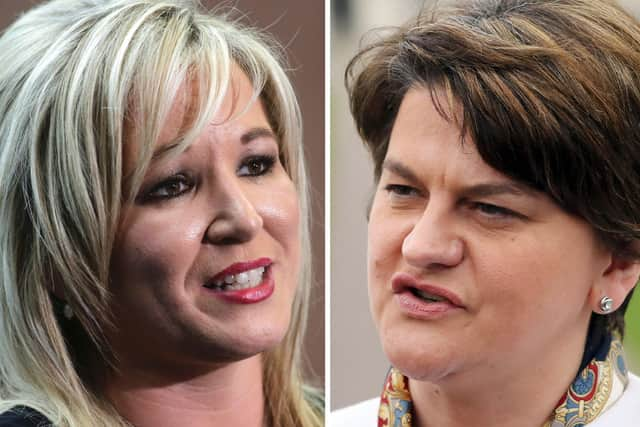Foster & O’Neill: It is not a binary choice between fighting Covid and saving the economy - our aim is to avoid lockdowns, save jobs and stop the virus.
and live on Freeview channel 276
First Minister Foster said at today’s press conference that the reproductive rate of the virus has dropped to an estimated 0.7.
However, both Mrs Foster and Deputy First Minister Michelle O’Neill expressed concern at the high numbers of patients in hospitals, which are at 100% capacity, and warned there is more work to do.
Advertisement
Hide AdAdvertisement
Hide AdHealth officials have recommended Northern Ireland’s shuttered pubs and restaurants should stay closed but no decision was taken at Stormont on Thursday.


Mrs Foster said: “Those discussions will continue and we will intensify our engagement with the hospitality sector representatives as we seek a safe and sustainable way forward for that industry.”
It was put to Mrs Foster that a leaked Department of Health paper recommends further restrictions on NI to control the virus.
But she replied that as First and Deputy First Minister they have to “look right across the piece to the impacts on society here in Northern Ireland”.It was their responsibility to look at the impact lockdowns might have, not just on infection rates, but also on the economy, mental health and family life, she said.The executive was working on a strategy to keep the R number below 1, meaning infection rates will continue to drop.
Advertisement
Hide AdAdvertisement
Hide AdMs O’Neill said: “I think what is also very clear from all the conversations we have had is that there needs to be more conversation between the Department of Health and also the hospitality sector. And that is something that I think needs to happen as a matter of urgency over the course of the next number of days and then we will come back to this as an Executive at the start of the week and allow us to be able to make an announcement”.Both ministers agreed there had been no disagreement on the issues but that work was ongoing to find a way forward.
Mrs Foster emphasised that there was not a binary choice between saving jobs and keeping infection rates down.
“I know some people see this as a binary choice. It is not a binary choice and I want to say that very strongly. We recognised that people who work in the hospitality industry have families, therefore they have to support those families, if they don’t have a job, if they don’t have wage to bring home they go into poverty.
“That has consequences in terms of people’s well being. So it is not a binary choice. What we are trying to do is come up with a strategy that recognises the very severe pressures on the health service... but at the same time we are saying that there are other pressures in the hospitality sector.”Ms O’Neill said there was “not much more to add” to the comments. She said a significant intervention had been needed to close schools and the hospitality sector in the current lockdown.
Advertisement
Hide AdAdvertisement
Hide Ad“But we want to find other ways because we don’t want eternal circuit breakers,” she added. “We have an immediate situation we must respond to but we have both said we want to get to a point where we find a way to keep the virus at a low enough rate to allow people to move around.”She said an exit strategy will focus on test and trace and isolation and speedily bringing in more rapid testing and better ways of testing and contact tracing.
Mrs Foster said there has been a 57% decrease in footfall in Belfast city centre but Ms O’Neill said 409 people are in hospitals with Covid-19, more than at any point in the first wave.
Combined with significant levels of staff absences across the system, she said, the situation was unsustainable and added health staff needed help.
“The infection rate won’t stay at a low enough level unless we work very hard to keep it there,” she said.
Advertisement
Hide AdAdvertisement
Hide AdThere have been 12 further Covid-19 linked deaths in Northern Ireland – eight within the last 24 hours and another four reported that occurred earlier, the Department of Health said.
Chancellor Rishi Sunak said today that the furlough scheme, which pays up to 80% of an employee’s wages, will be extended to March. He also announced a further £400m Covid funding for NI.
The First and Deputy First Ministers also met with Rhonda Tait on Thursday, whose mother Josephine Brown died of Covid in April. An emotional video advert by Ms Tait was played in which she urged people to wear masks to prevent the virus spreading.
Roger Pollen of the FSB today urged ministers to give businesses “clarity” on what situation they will face next week. SDLP Leader Colum Eastwood MP and UNISON Regional Secretary Patricia McKeown both urged ministers to extend the current lockdown in order to save lives.
A message from the Editor:
Advertisement
Hide AdAdvertisement
Hide AdThank you for reading this story on our website. While I have your attention, I also have an important request to make of you.
With the coronavirus lockdown having a major impact on many of our advertisers - and consequently the revenue we receive - we are more reliant than ever on you taking out a digital subscription.
Subscribe to newsletter.co.uk and enjoy unlimited access to the best Northern Ireland and UK news and information online and on our app. With a digital subscription, you can read more than 5 articles, see fewer ads, enjoy faster load times, and get access to exclusive newsletters and content. Visit https://www.newsletter.co.uk/subscriptions now to sign up.
Our journalism costs money and we rely on advertising, print and digital revenues to help to support them. By supporting us, we are able to support you in providing trusted, fact-checked content for this website.
Alistair Bushe
Editor